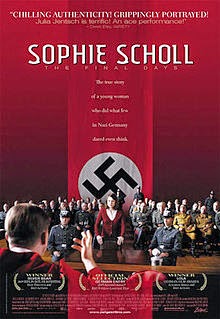
By Norris Thomlinson, Deep Green Resistance Hawaii
Sophie Scholl – The Final Days (a German film with the original title of Sophie Scholl – Die letzten Tage) depicts the true story of a courageous young German woman, standing strongly behind her principles, as she faces charges in 1943 of undermining Nazi Germany. Scholl and a network of more than twenty others comprised the White Rose, opposing the Nazi regime through propaganda of graffiti and leaflets. The film centers on Scholl and her capture, interrogation, time in jail, and trial. A few other White Rose members are shown peripherally, most notably her brother Hans, captured with her during the same action.
After the depiction early in the film of the leaflet distribution which got the Scholls caught, the “action” ends, but if you’re interested in the dynamics of resistance movements and state repression, there’s still plenty to keep you engrossed. Sophie Scholl’s calm weaving of a plausible cover story under interrogation, followed by an equally calm steadfast defense of her beliefs, is gripping in its opposition to power in the face of grave danger. Scholl fights a battle of words for freedom and possibly life not only for herself, but for her brother, her parents, and many other comrades.
Stanley Diamond diagnosed: “Civilization originates in conquest abroad and repression at home.” Once the Scholls’ guilt is unequivocally revealed, Sophie eloquently argues with her interrogator and with the court, addressing the implications of Hitler’s empire. The argument ranges from practical concerns of the impossibility of Germany winning against the combined opposition of America, England, and Russia to philosophical questions of blindly following government laws vs using conscience and God as moral guides. The Scholls point out the inevitability of military defeat and the senseless slaughter of German and foreign soldiers; and decry concentration camps, the extermination of mentally ill children, and German soldiers killing women and children. As we experience now regarding modern atrocities, those in power react with willful denial, rage meant to silence, detached sociopathic justifications, and of course retribution. The poignancy of these few young people raising their voices against mass consensus and state repression is alleviated only by the viewers’ knowledge of the accuracy of their predictions of Nazi defeat and repercussions for those who upheld its odious operations.
We can take inspiration to be as brave and accurate as the Scholls and the White Rose as we speak out against civilization at the root of our ecological and social crises, and as we call for, predict, and enact its dismantling.
Besides aspiring to their level of courage and honesty, we can also learn from their mistakes. Hans and Sophie Scholl knew they were taking a huge risk by distributing leaflets during the day; the rest of their group urged them not to try it. Hans carried evidence incriminating not only himself, but another member of their network, and left more incriminating evidence at home, easily found in a house raid.
The lack of compartmentalization of the White Rose network exposed and endangered them all following the capture of the Scholls. Aric McBay describes aboveground and underground organizational structures in the Deep Green Resistance book and in his video presentation Organizational Structures for Resistance. Careful consideration of organizational structure and of Security Culture is required now more than ever in the face of advanced surveillance and investigative technologies.
Finally, the White Rose believed first that their leaflets and then that state persecution would spark a student uprising. That hope may or may not have been justified, but such a revolt never occurred, and is reminiscent of the belief of the 1970s Weather Underground that they could provoke a youth rebellion by rioting and fighting cops in the street. We need to work from a realistic strategy based on a realistic assessment of likely engagement, and not just hope that our example will motivate a critical mass to take action.
Sophie Scholl – The Final Days is a moving glimpse into one of many historical resistance movements from which we can learn and take inspiration.